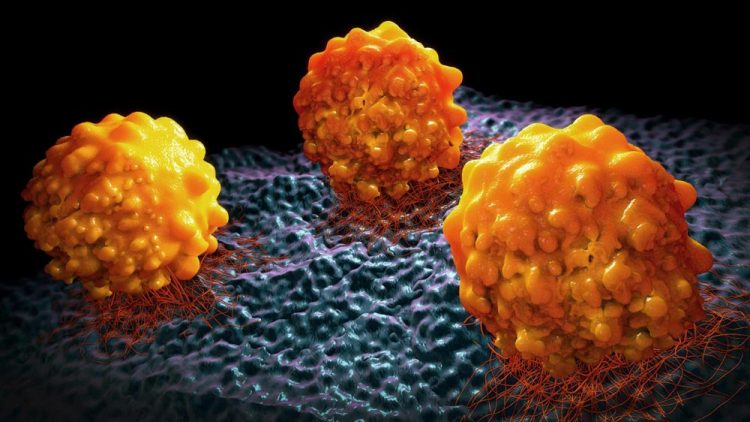Preventing metastasis by stopping cancer cells from making fat

Olivier Feron, a UCLouvain researcher, studies how cancer spreads through the body via metastasis. His major discovery was that cancer cells multiply by using lipids as food. His latest discovery, published in the scientific journal Nature Communications, is that lipid storage promotes cancer invasiveness. A new drug currently being tested to treat obesity may also help fight metastasis. Credit: copy University of Louvain
They identified a factor called TGF-beta2 as the switch responsible for both lipid storage and the aggressive nature of cancer cells. Moreover, it appeared that the two processes were mutually reinforcing. In fact, by accumulating lipids, more precisely fatty acids, cancer cells build up energy reserves, which they can then use as needed throughout their metastatic course.
Already known was that the acidity found in tumours promotes cancer cells' invasion of healthy tissue. The process requires the detachment of the cancer cell from its original anchor site and the ability to survive under such conditions (which are fatal to healthy cells).
The new finding: UCLouvain researchers demonstrated that this acidity promotes, via the same TGF-beta2 'switch', the invasive potential and formation of lipid droplets.
These provide the invasive cells with the energy they need to move around and withstand the harsh conditions encountered during the metastatisation process. It's like a mountaineer who takes the food and equipment necessary to reach the summit in spite of complex weather conditions.
Concretely, this UCLouvain research opens up new therapeutic avenues thanks to the discovery of the different actors involved in metastasis. These actors can thus be targeted and combated.
Prof. Feron and his team show that it is possible to reduce tumour invasiveness and prevent metastases using specific inhibitors of TGF-beta2 expression but also compounds capable of blocking the transport of fatty acids or the formation of triglycerides.
Among the latter are new drugs that are being evaluated to treat obesity. Their indications could therefore be rapidly extended to counter the development of metastases, which is the major cause of death among cancer patients.
The findings are published in the prestigious scientific journal Nature Communications. The research was carried out with funding from the Belgian Cancer Foundation, the Belgian National Fund for Scientific Research, the Télévie telethon, and a Wallonia Brussels Federation joint research grant (ARC).
Media Contact
More Information:
http://dx.doi.org/10.1038/s41467-019-14262-3All latest news from the category: Health and Medicine
This subject area encompasses research and studies in the field of human medicine.
Among the wide-ranging list of topics covered here are anesthesiology, anatomy, surgery, human genetics, hygiene and environmental medicine, internal medicine, neurology, pharmacology, physiology, urology and dental medicine.
Newest articles

Innovative vortex beam technology
…unleashes ultra-secure, high-capacity data transmission. Scientists have developed a breakthrough optical technology that could dramatically enhance the capacity and security of data transmission (Fig. 1). By utilizing a new type…

Tiny dancers: Scientists synchronise bacterial motion
Researchers at TU Delft have discovered that E. coli bacteria can synchronise their movements, creating order in seemingly random biological systems. By trapping individual bacteria in micro-engineered circular cavities and…

Primary investigation on ram-rotor detonation engine
Detonation is a supersonic combustion wave, characterized by a shock wave driven by the energy release from closely coupled chemical reactions. It is a typical form of pressure gain combustion,…



